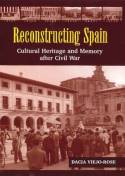Reconstructing Spain
cultural heritage and memeory after Civil War
- ISBN: 9781845194352
- Editorial: Sussex Academic Press
- Fecha de la edición: 2011
- Lugar de la edición: Brighton. Reino Unido
- Encuadernación: Cartoné
- Medidas: 24 cm
- Nº Pág.: 272
- Idiomas: Inglés

This book explores the role of cultural heritage in post-conflict reconstruction, whether as a motor for the prolongation of violence or as a resource for building reconciliation. The research was driven by two main goals: first, to understand the post-conflict reconstruction process in terms of cultural heritage, and second, to identify how this process evolves in the medium term and the impact it has on society. The Spanish Civil War (1936-39) and its subsequent phases of reconstruction provides the primary material for this exploration. In pursuit of the first goal, the book centres on the material practices and rhetorical strategies developed around cultural heritage in post-civil war Spain and the victorious Franco regime's reconstruction. The analysis seeks to capture a discursively complex set of practices that made up the reconstruction and in which a variety of Spanish heritage sites were claimed, rebuilt or restored and represented in various ways as signs of historical narratives, political legitimacy and group identity. The reconstruction of the town of Gernika is a particularly emblematic instance of destruction and a significant symbol within the Basque regions of Spain as well as internationally. By examining Gernika it is possible to identify some of the trends common to the reconstruction as a whole along with those aspects that pertain to its singular symbolic resonance. In order to achieve the second goal, the processes of selection, value change and exclusionary dynamics of reconstruction and the responses it elicits are examined. Exploring the possible impact of post-civil war reconstruction in the medium term is conducted in two time frames: the period of political transition that followed General Franco's death in 1975; and the period 2004-2008, when Rodriguez Zapatero's government undertook initiatives to 'recover the historic memory' of the war and dictatorship. Finally, the observations made of the Spanish reconstruction are analysed in terms of how they might reveal general trends in post-conflict reconstruction processes in relation to cultural heritage. These insights are pertinent to the situations in Cambodia, Bosnia and Herzegovina, Afghanistan and Iraq.






